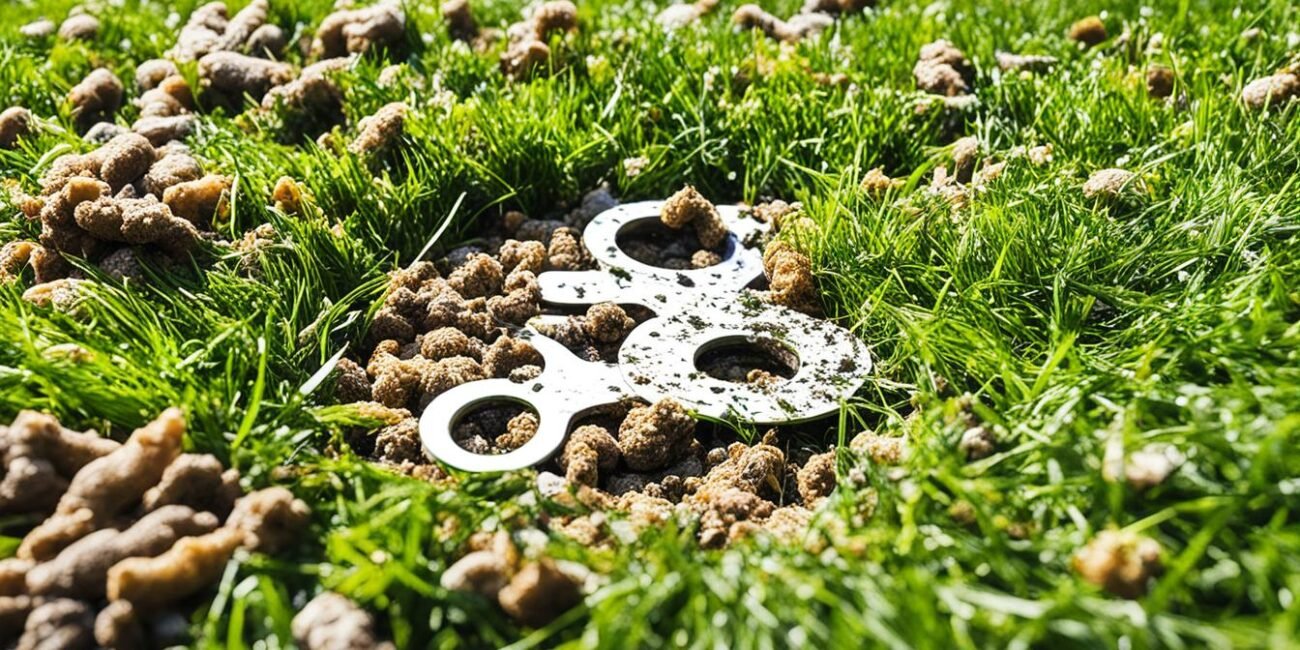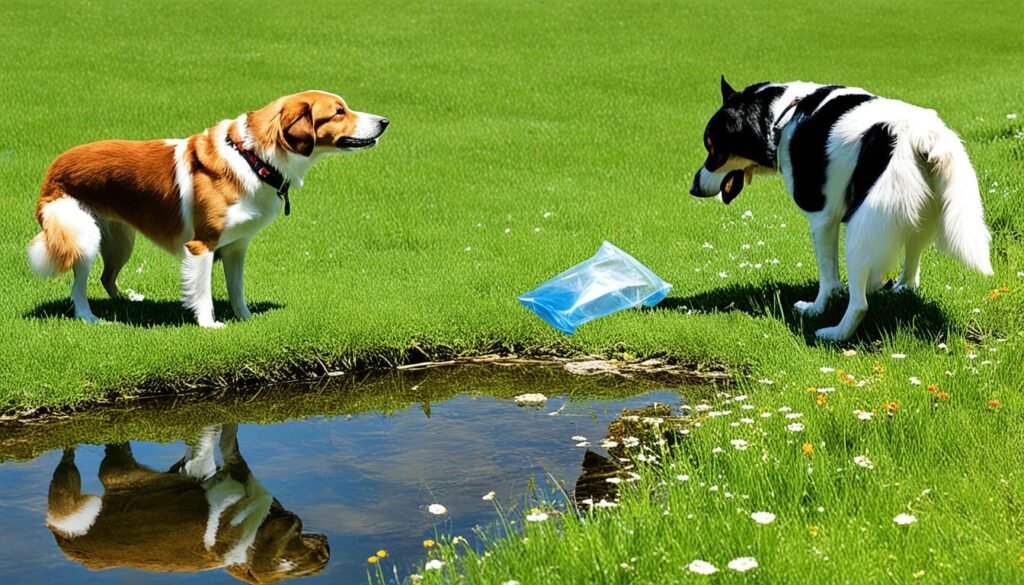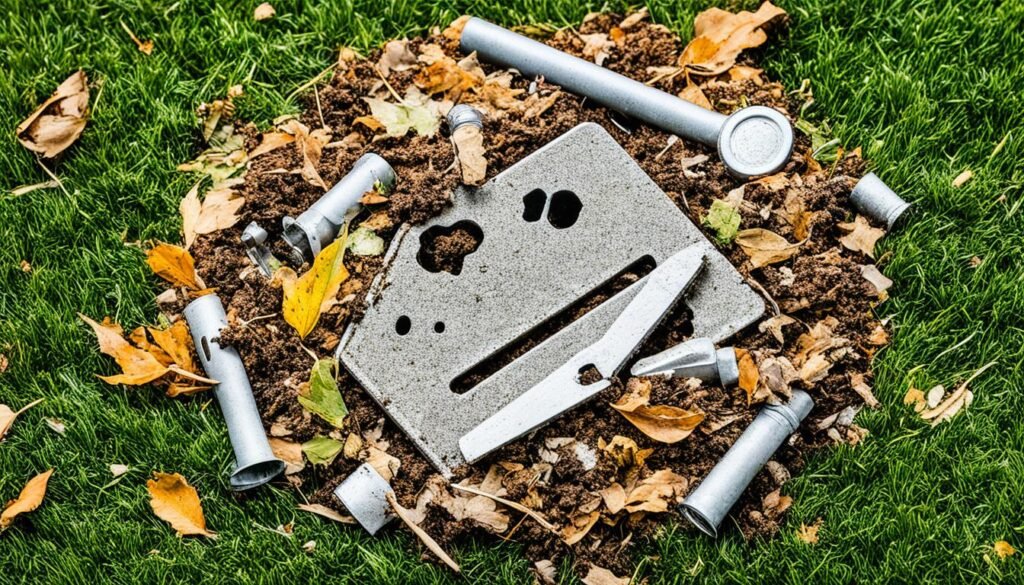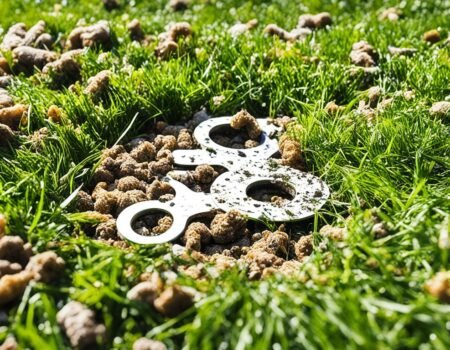As a responsible dog owner, the question of whether or not to pick up your pup’s poop while out on a walk might have crossed your mind. It’s a topic that often leads to debate among pet owners, but the answer is clear: yes, you should always pick up your dog’s poop when walking.
Let me share a personal experience that made me realize the importance of dog waste cleanup. One sunny afternoon, I was taking my dog, Max, for a stroll in the park. Enjoying the fresh air, we strolled along the winding paths, appreciating nature’s beauty. Suddenly, I spotted something ahead on the path. It was an unfortunate mess left behind by an irresponsible dog owner who had neglected to clean up after their furry friend.
I couldn’t help but feel disgusted and disappointed. Not only did this unsightly sight ruin the peaceful atmosphere, but it also posed a health risk to other park visitors, including children who often play in the grass. That day, I vowed to never let Max leave his mark without cleaning up after him.
Responsible pet ownership extends beyond providing food, love, and care for our furry companions. It includes ensuring that our dogs’ waste is properly disposed of. Dog waste cleanup is not just about common courtesy, but it’s also essential for community hygiene and environmental health.
Key Takeaways:
- Picking up your dog’s poop when walking is crucial for responsible pet ownership.
- Not cleaning up after your dog can pose health risks to other people and pets.
- Dog waste can contaminate water supplies and harm the environment.
- By picking up after your dog, you contribute to a cleaner and healthier community.
- Always carry doggy bags while walking your dog to be prepared for cleanups.
Be prepared
To be prepared for picking up your dog’s poop, always carry doggy bags when you go for a walk. Forgetting to bring doggy bags can turn your peaceful walk into a messy situation. Consider keeping a few bags in your jacket pocket to ensure you’re always well-prepared. Using biodegradable plastic bags is recommended as they degrade faster than regular plastic bags, reducing their environmental impact.
Being prepared not only helps keep the environment clean but also shows responsibility as a pet owner. By having doggy bags on hand, you’re actively contributing to the well-being of your community.
Use technique and technology to make picking up poop a breeze
When it comes to picking up dog poop, using the right technique can make the task quick and hassle-free. One of the best ways to pick up dog poop is by turning the bag inside out over your hand like a glove, picking up the poop, and then turning the bag back the right way. This method ensures a clean and mess-free cleanup, making it easier for you to maintain a clean walking environment for both you and your furry friend.
However, if you’re not comfortable picking up poop with your hand, don’t worry! There are other options available to make the job easier. Consider using a pooper scooper. Pooper scoopers are handy tools designed specifically for picking up dog waste. They come in various types, including rake-style scoopers and spade scoopers. Simply use the scooper to collect the poop, and dispose of it properly. Using a pooper scooper can provide an added layer of convenience while minimizing direct contact with dog waste.
Using the right technique and technology can make picking up dog poop a breeze, allowing you to maintain a clean and hygienic environment while enjoying your walks with your four-legged friend.
Dispose of the poop correctly
After picking up your dog’s poop, it’s important to dispose of it correctly. Proper disposal helps minimize the impact on the environment and maintains community cleanliness. Here are some responsible ways to handle dog waste:
- Designated dog waste trash cans: Utilize the designated dog waste trash cans found in dog parks and other public areas. These trash cans are specifically designed to handle dog waste and ensure proper disposal.
- Flushing dog poop down the toilet: In some areas, flushing dog poop down the toilet is acceptable. However, it’s crucial to note that plastic bags should never be flushed. Flushing dog waste directly reduces the chances of contamination and helps prevent the release of harmful bacteria into the environment.
| Pros | Cons |
|---|---|
| Convenient and hygienic disposal option | Not suitable in all areas due to plumbing and wastewater system limitations |
| Reduces foul odor and potential contamination in outdoor trash cans | Requires careful attention to avoid flushing plastic bags |
| Prevents surface and groundwater pollution | May not be widely allowed in public restrooms |
Remember:
Always prioritize the correct disposal of dog waste to maintain a clean environment for everyone. By using designated trash cans or flushing dog poop down the toilet where permitted, you contribute to the overall cleanliness and well-being of your community.
Don’t let your dog poop near a water source
When walking your dog, it’s crucial to be mindful of where they do their business. Avoid allowing your furry friend to relieve themselves near rivers, lakes, or any other bodies of water. Dog waste has a significant environmental impact and can pose risks to the local ecosystem.
Dog poop can contain harmful bacteria and parasites that can contaminate water sources, making them unsafe for humans and wildlife. This contamination can disrupt the natural balance of aquatic ecosystems and harm the plants and animals that rely on clean water.
One particular concern is storm drains. It’s essential to resist the temptation to dispose of dog poop in storm drains. These drains are connected to the sewage system, and any waste that enters them can flow directly into nearby water sources, such as rivers and streams.
“Dog poop may seem harmless, but it can have a significant impact on water quality. It’s important to be responsible and avoid allowing dog waste near water sources to protect the environment and preserve aquatic ecosystems.” – Dr. Emily Johnson, Environmental Scientist
To emphasize the importance of avoiding dog poop near water, here’s a concise list of reasons:
- Dog waste contains bacteria and parasites that can contaminate water sources
- Contamination can harm local wildlife, disrupting aquatic ecosystems
- Disposing of dog poop in storm drains can directly pollute rivers and streams
Remember, we all play a role in preserving the environment and keeping our water sources clean. By being mindful of where your dog poops and properly disposing of their waste, you contribute to a healthier ecosystem for everyone.
| Environmental Impacts of Dog Poop Near Water | Why It Matters |
|---|---|
| Contamination of water sources | Harmful bacteria and parasites in dog waste can contaminate water, making it unsafe for humans and wildlife. |
| Disruption of aquatic ecosystems | When water sources are contaminated, it can disrupt the natural balance of aquatic ecosystems and harm plants and animals. |
| Pollution through storm drains | Disposing of dog waste in storm drains can directly pollute nearby rivers and streams, impacting the entire watershed. |
Pay attention to where they go
Dogs often have their favorite spots to relieve themselves. It’s important to pay attention to where your dog likes to go, whether it’s on the pavement, in the bushes, or on the grass. By understanding your dog’s preferred spot, you can easily clean up after them every time.
When walking along your usual dog walking route, be mindful of the areas where your dog usually poops. This way, you can ensure you don’t miss cleaning up after them and maintain a clean environment for everyone.
Know your dog’s preferences
- Some dogs prefer to poop on grassy areas.
- Others may feel more comfortable going in the bushes.
- Some dogs may even prefer going on pavement or concrete.
Understanding your dog’s preferences will help you anticipate their actions and be prepared to clean up after them. It’s all part of being a responsible pet owner.
“Knowing where my dog likes to go makes it so much easier to clean up after him. I always have doggy bags ready and pay attention to his favorite spots.” – Jessica, dog owner
Keep an eye out for signs
As you walk your dog, watch for signs that they may need to relieve themselves. Sniffing the ground, circling, or suddenly stopping can indicate that they’re looking for the perfect spot.
| Signs that your dog needs to go | What to do |
|---|---|
| Sniffing the ground | Prepare a doggy bag and be ready to clean up after them. |
| Circling in one spot | Take them to a suitable spot and keep the doggy bags handy. |
| Suddenly stopping during the walk | Pause and allow them to find a spot, then clean up the poop. |
By paying attention to these signs, you can help prevent accidents and avoid leaving dog poop behind.
It will not break down on its own
Contrary to popular belief, dog poop does not break down on its own. It can take up to 12 months to fully decompose. When rainwater washes over dog poop, it can flow into drainage systems and contaminate lakes, streams, and rivers, potentially causing fecal water. Studies have shown that up to 30% of bacteria found in watersheds come from pet waste.
The slow decomposition process of dog waste poses a significant risk to the environment and public health. The bacteria and pathogens present in dog poop can seep into the soil and contaminate water sources, putting aquatic life and humans at risk. The contamination of water sources by dog waste can lead to the outbreak of waterborne diseases, affecting both animals and people.
Proper disposal of dog waste is crucial to prevent the contamination of water sources and the spread of diseases. By picking up after our dogs and disposing of their waste responsibly, we can contribute to the overall cleanliness and health of our communities.
Disease-causing bacteria and parasites
Dog waste is not only unsightly, but it can also pose serious health risks due to the presence of disease-causing bacteria and parasites. In fact, dog waste has been found to contain harmful pathogens such as E. coli and Salmonella, which can cause gastrointestinal illnesses in both dogs and humans.
Even if your dog appears healthy, their waste may still harbor these bacteria and parasites. When left unattended, these pathogens can contaminate the soil and persist for years, posing a risk to anyone who comes into contact with it. Children who play outside and gardeners are particularly vulnerable to the health hazards associated with dog waste.
That is why it is crucial to properly pick up and dispose of your dog’s waste. By doing so, you are not only protecting the health of your community but also safeguarding other animals and humans from potential infections.
Preventing the Spread of Disease
Properly picking up your dog’s waste is the first line of defense against the spread of diseases. Here are some key prevention measures to follow:
- Always carry doggy bags or biodegradable plastic bags when walking your dog to ensure you are prepared to clean up after them.
- Use the “bag glove” technique: turn the bag inside out over your hand like a glove, pick up the waste, and then turn the bag back the right way.
- Consider using a pooper scooper if you’re not comfortable picking up waste with your hand.
- Dispose of the waste in designated dog waste trash cans or follow local regulations for flushing it down the toilet (without flushing plastic bags).
- Avoid dog waste near water sources such as rivers, lakes, and storm drains, as it can contaminate the water and harm the ecosystem.
Protection for Everyone
By taking these precautions and being responsible pet owners, we can minimize the risk of disease spread and protect everyone from the harmful effects of bacteria and parasites in dog waste. Remember that it’s not just a matter of cleanliness, but also a matter of public health and environmental stewardship.
| Disease-causing Bacteria and Parasites | Health Risks |
|---|---|
| E. coli | Gastrointestinal illnesses, including diarrhea and abdominal cramps. |
| Salmonella | Food poisoning symptoms, such as fever, nausea, vomiting, and diarrhea. |
It’s common courtesy to pick up after your dog
Picking up after your dog is not only responsible pet ownership, but it’s also good manners and an essential part of pet waste etiquette. Leaving dog poop in public places can create an unpleasant smell and pose a health risk to both humans and other animals. It’s our duty as pet owners to clean up after our dogs to maintain a clean and safe environment for everyone.
By picking up after your dog, you show respect for your community and fellow residents. No one wants to step on dog poop or have their children play near it. It’s a simple act of consideration and common decency to keep public spaces clean and free from pet waste.
“Responsible dog ownership means being mindful of the impact your pet has on the environment and the community. Cleaning up after your dog is not just a legal requirement in many areas, but a way to show respect for others and promote a positive image of dog owners.”
– Dr. Emily Johnson, Veterinarian
In many jurisdictions, it’s not just a matter of courtesy but also a legal requirement to clean up after your dog. Failing to do so can result in fines and penalties. By adhering to these laws and regulations, we demonstrate responsible dog ownership and contribute to the overall cleanliness of our neighborhoods.
When picking up your dog’s poop, it’s important to use environmentally-friendly options. Consider using biodegradable bags or compostable bags instead of regular plastic bags. These eco-friendly alternatives break down more easily and have a lower environmental impact.
Tips for responsible dog ownership:
- Always carry doggy bags with you when walking your dog.
- Dispose of the poop in designated dog waste trash cans.
- Consider using biodegradable or compostable bags.
- Do not flush plastic bags or dog waste down the toilet.
- Be aware of local laws and regulations regarding pet waste cleanup.
By following these simple guidelines, we can all contribute to a cleaner, healthier, and more respectful environment for everyone. Let’s take responsibility for our furry friends and set a positive example for others as responsible dog owners.
Conclusion
Picking up your dog’s poop when walking is not just a simple chore, it is a responsibility that every pet owner should embrace. By practicing responsible dog waste disposal, you contribute to the cleanliness of your community and ensure the well-being of both humans and the environment.
The impacts of dog waste on water supplies cannot be ignored. Contamination from dog waste can seep into water sources, posing a risk to human health and the ecosystem. Additionally, dog waste contains disease-causing bacteria and parasites that can spread to other dogs and even humans.
By being prepared with doggy bags, using proper techniques and technology like pooper scoopers, and disposing of dog waste correctly in designated trash cans, you can prevent pollution and keep your community clean and safe. Your efforts contribute to a healthier and more pleasant environment for everyone to enjoy.
So, let’s all take part in responsible pet ownership and make a conscious effort to pick up after our dogs. Together, we can make a significant difference in preserving the cleanliness of our community and promoting a better quality of life.
FAQ
Should I pick my dog’s poop up when walking?
Yes, it is important to pick up your dog’s poop when walking for several reasons. Not only is it a responsible practice for pet ownership, but it also contributes to community health. Dog waste can contaminate water supplies and release harmful bacteria into the environment. Additionally, leaving dog poop in public places can create unpleasant smells and pose a health risk.
How can I be prepared for picking up my dog’s poop?
To be prepared for picking up your dog’s poop, always carry doggy bags when you go for a walk. Consider keeping a few bags in your jacket pocket to ensure you’re always well-prepared. Using biodegradable plastic bags is recommended as they degrade faster than regular plastic bags, reducing their environmental impact.
What is the best way to pick up dog poop?
The best technique for picking up dog poop is to turn the bag inside out over your hand like a glove, pick up the poop, and then turn the bag back the right way. This method ensures a clean and mess-free cleanup. If you’re not comfortable picking up poop with your hand, consider using a pooper scooper. There are various types available that make the job easier.
How should I dispose of my dog’s poop?
It’s important to dispose of your dog’s poop correctly. Avoid composting dog waste as the low temperature may not kill bacteria. Instead, use designated dog waste trash cans found in dog parks and other public areas. Flushing dog poop down the toilet is acceptable in some areas, but it’s important not to flush plastic bags.
Should I let my dog poop near a water source?
No, it’s important to prevent your dog from pooping near rivers, lakes, or other bodies of water. Dog waste can contain harmful bacteria that can contaminate the water and harm the local ecosystem. It’s also important not to dispose of dog poop in storm drains as it can end up in nearby water sources.
Should I pay attention to where my dog prefers to poop?
Yes, dogs often have favorite spots to relieve themselves. Pay attention to where your dog likes to go, whether it’s on pavement, in the bushes, or on the grass. Knowing their preferred spot will make it easier to clean up after them every time. If you’re walking along your usual dog walking route, be mindful of the areas where your dog usually poops to ensure you don’t miss cleaning up after them.
Does dog poop break down on its own?
No, contrary to popular belief, dog poop does not break down on its own. It can take up to 12 months to fully decompose. When rainwater washes over dog poop, it can flow into drainage systems and contaminate lakes, streams, and rivers, potentially causing fecal water. Studies have shown that up to 30% of bacteria found in watersheds come from pet waste.
Can dog waste spread diseases?
Yes, dog waste can carry disease-causing bacteria and parasites such as E. coli and salmonella. Even if your dog seems healthy, their waste can still be harmful to other dogs and humans. These bacteria and parasites can stay in the soil for years, posing a risk to anyone exposed. Properly picking up your dog’s waste helps protect people and other animals from harmful bacteria.
Is picking up after your dog common courtesy?
Yes, picking up after your dog is not only responsible pet ownership, but it’s also common courtesy. Leaving dog poop in public places can create an unpleasant smell and pose a health risk. It’s your duty as a pet owner to clean up after your dog, and in some areas, it’s even the law. Using biodegradable bags or compostable bags is a more environmentally-friendly option.
Why is responsible dog waste disposal important?
Responsible dog waste disposal is important for community cleanliness and health. Dog waste can contaminate water supplies, spread diseases, and create unpleasant odors. By being prepared, using proper techniques and technology, and disposing of the waste correctly, you can ensure a cleaner and healthier environment for everyone.









No Comment! Be the first one.